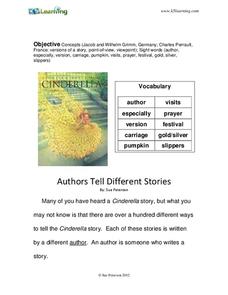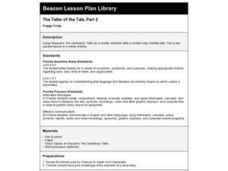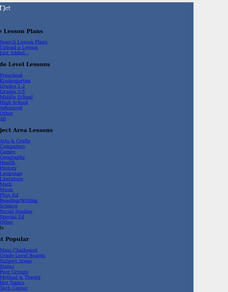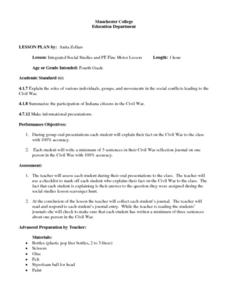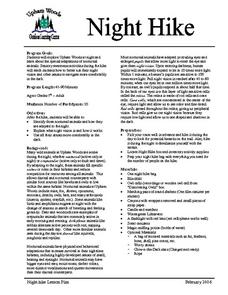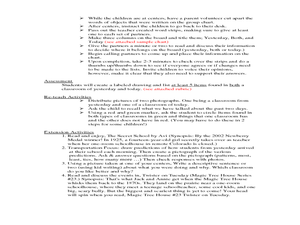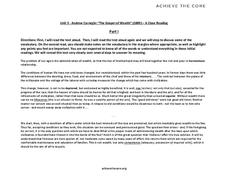Curated OER
STORY MAPPING: THE HUNDRED DRESSES
Students illustrate and paraphrase each chapter of The Hundred Dresses, creating a graphic organizer through the use of story mapping. After students have completed their story maps, ask for a few volunteers to present theirs to the class.
Curated OER
The Hundred Dresses by Eleanor Estes
Students listen to story The Hundred Dresses, and use adjectives to describe each character.
Curated OER
Finding the dress code balance
Students write a persuasive essay, expressing their opinions of how the school dress code should be changed. Students investigate their own school's dress code, developing their own opinions of whether the dress code should be more or...
Curated OER
The Hundred Dresses
Students discuss the importance of courage. They read the story, "The Hundred Dresses," which is a timeless story about the hurt inflicted by teasing and the painful consequesnces for bystanders who fail to act courageously. Students...
Curated OER
What was School Like 100 Years Ago?
Focussing on the Edwardian Era culture, students view photographs of students at school in the past and compare and contrast them to their school now. Students describe the differences in dress, classrooms, and classes. This could start...
K5 Learning
Authors Tell Different Stories
The story of Cinderella is a popular one! So much so, there are multiple versions of the story being told around the world. With this collection of activities your young readers receive background information about two versions...
English To Go
Articles: A, An, The, or -
Help your young native English speakers discern between a, an, or the with this two-page document. Each article is explained before short practice assessments are offered. A short paragraph on the second page also explains what is known...
Brooklyn Museum
HIDE/SEEK: Difference and Desire in American Portraiture
Visual arts lessons don't always mean the children need to make art. Here, they will practice using their visual literacy skills to analyze four images through the compare and contrast method. The first two images deal with gender...
EngageNY
End-of-Module Assessment Task: Grade 7 Mathematics Module 5
Show learners how to use simulations and random sampling to reach conclusions with the last resource in a 25-part series. The assessment contains three scenarios, each with several parts, and covers comparing populations using random...
Curated OER
What Did It Cost 100 Years Ago?
Students compare prices of good across the century in order to introduce the topic of inflation. They undertand the concepts of inflation and Consumer Price Index (CPI), use online calculators to figure the approximate cost of goods...
Curated OER
The Teller of the Tale, Part 2
Students discuss character types and their qualities. They select two characters and write about their dress, speech, habits, attitudes and beliefs. They write a monologue as the characters presenting a moral theme.
National Institute of Open Schooling
Periodic Table and Atomic Properties
An in-depth lesson, the fourth activity in a series of 36, begins with teaching how the periodic table's arrangement came to its current design. Using this knowledge, pupils then move on to analyze the arrangement of elements to their...
Curated OER
Percents and Discounts
Learners convert between decimals and percents. In this algebra instructional activity, students define percent as it relates to sales and tax. They calculate the percents of number using multiplication.
Curated OER
Winter Survival Kit
Fifth graders construct a winter emergency kit for their parents' car and list five things to do or not to do when stranded in a car during the winter.
Curated OER
Then and Now
First graders investigate the past and present by analyzing a group of images. In this community history instructional activity, 1st graders read the story Sarah Morton's Day by Kate Walters and discuss the time frame of the story....
Curated OER
Integrated Social Studies and PE Fine Motor Lesson
Fourth graders study the Civil War and Indiana's participation in the war. In groups, they choose a person from the Civil War and create a "bio bottle" of that person. They use fine motor skills to create and dress a model of that...
Curated OER
Ballet
First graders identify word families and demonstrate a variety of ballet moves. They listen to the book "Angelina on Stage," and observe and demonstrate three ballet moves. Students then match a family word with other rhyming words,...
Curated OER
Night Hike
Students explore Upham Woods at night and investigate about the special adaptations of nocturnal animals. They identify three nocturnal animals and how they are adapted to the night. Students explain what night vision is and how it works.
Curated OER
Classrooms: Then and Now
Students look at schoolhouses from the past. In this comparative analysis lesson, students visit a one room school house and look at the tools used for learning. Students then compare the schoolhouse of the past to the schoolhouse of today.
Curated OER
Math Maven's Mysteries
In these story problem worksheets, 5th graders read the story problem of 'The Case of the Troublesome Triplets.' Students then use the information from the story to help them solve the problem. Students find the money left and figure out...
Curated OER
Coney Island
Students compare the Coney Island of today to the Coney Island of 100 years ago. While discussing the features of Coney Island, students brainstorm their associations of the area. Through observing several pictures of Coney Island,...
Curated OER
ADULT ESOL LESSON PLAN--Consumer Education
Students research the various establishments where one can buy clothing and the cost of those purchases. With the help of a lengthy vocabulary list, magazines and newspapers, students name and identify the cost of basic items of clothing.
Curated OER
The Gospel of Wealth by Andrew Carnegie: A Close Reading
Andrew Carnegie's "The Gospel of Wealth" provides high schoolers an opportunity to engage more complex text. After a close reading of the essay and an analysis of Carnegie's argument that the rich are superior because they earn money,...
Curated OER
Hey Kid, Want To Buy A Bridge?
Learners study the building of the Brooklyn Bridge and the inventions of Thomas Alva Edison. They design an infomercial to sell a product or a service for an invention. They create an invention that improves the world and write an...







